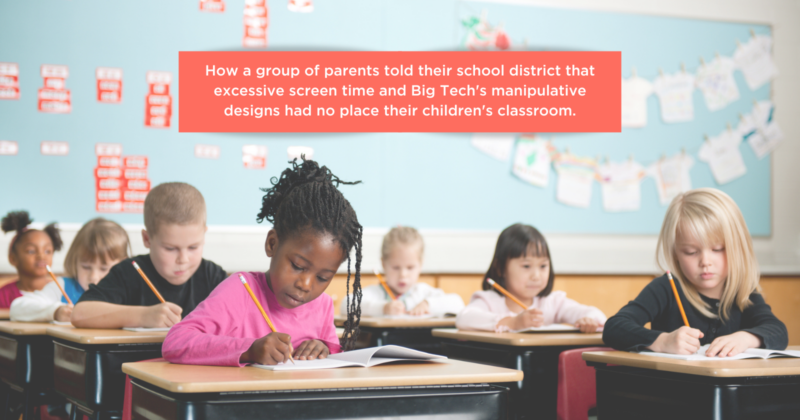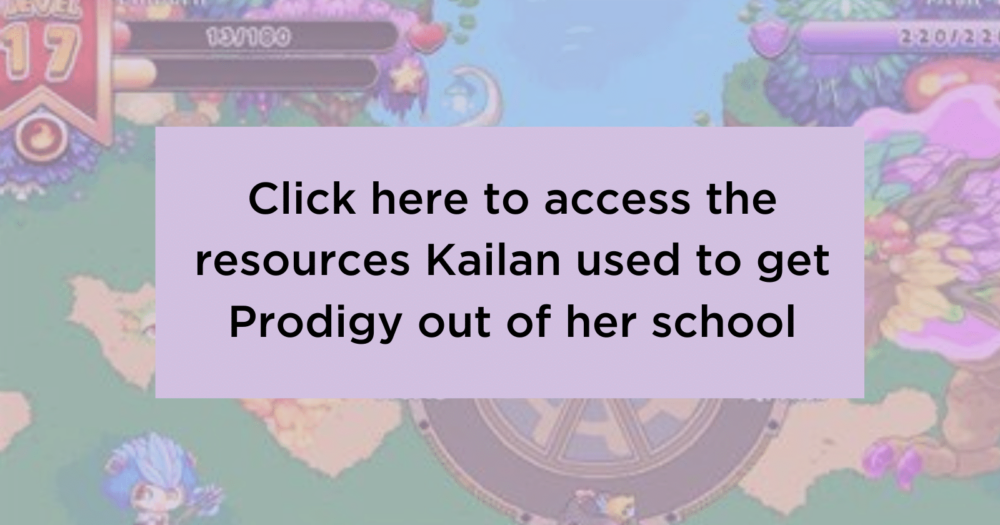by Kailan Carr
Kailan Carr M. Ed., is a former teacher, author, speaker, and owner of Quiet Book Queen and Crafts in Between. She is on a mission to help caregivers prioritize play in a screen-saturated world. This is her story about advocating for her school district to say no to Prodigy, a “math game” currently recommended by many teachers to millions of students across the globe.
One math problem. Several minutes of mindless gameplay. And repeat.
My first experience with Prodigy was during the pandemic when my son’s first grade teacher listed it as something students could do during the “school day” of remote learning. He was very curious about it, and wanted to play badly, because his teacher talked about it. I used it as an opportunity to see what kinds of online programs the school was offering. As a parent, you often hear about these programs, but don’t get to see them in action.
Well, that one time was enough. What I saw was ridiculous.
The amount of math actually being practiced was so minimal compared to the several minutes of basically playing video games or messing with avatars. It serves up a big plate of manipulation and distraction in the guise of learning.
My son loved it of course, and what child wouldn’t? It’s designed to keep them on as long as possible and to make them want to come back.
But we talked about those exact things and how there are better ways to practice math that don’t come with gamification and screen effects.
Fast forward to when the kids were back to school in- person, and I asked their new teachers about their use of Prodigy. They both agreed with my conclusions and said they don’t have their students use it.
But, my nephew’s teacher had her students using Prodigy, on what seemed like every day—and he became obsessed. He even asked for a subscription for it for Christmas.
It became clear that Prodigy is infiltrating schools by initially offering a free program that will get kids hooked and then pressuring them for the paid subscription. It’s shameful that at school— a place that should be free from advertising and persuasion—kids are getting that marketing pressure. And if they don’t end up with a subscription, the inequities are obvious in the game options with students who cannot afford it feeling left out.
I want to be clear that I don’t fault the school or teachers who do use Prodigy. My issues stem from the platform itself.
I am a former teacher, and I care about ALL students. I just don’t see a game like Prodigy as a quality way to spend valuable educational minutes. I started bringing it up to other parents and realized several felt the same way about Prodigy and had broader questions about time spent on devices in the classroom.
I came across Fairplay’s outstanding resource highlighting everything problematic with Prodigy and decided I needed to go bigger than just bringing it up with my child’s teacher each year.
A few other parents agreed to go with me to discuss it with the principal. I printed out Fairplay’s article, as well as the Ed Tech Report from www.everyschool.org, and aired our grievances about the overuse of technology in schools after the pandemic, specifically our concerns with Prodigy.
The principal listened. She agreed. But it was bigger than her.
So, we asked for a meeting with the Superintendent and Head of Curriculum and Instruction. I printed all the same things to bring to their attention.
They listened. And they said they’d look into it.
A few months had passed when I got an email saying the district had decided to discontinue the use of Prodigy for the next school year in the best interest of all students’ academic progress and overall development.
The first emotion I felt was shock. They listened and they are doing something! And then, I felt pure happiness knowing that students wouldn’t have that platform fighting for their attention each day.
Being an advocate and going against the flow can be difficult —— for any program or screen time concern! It may feel like change will never happen which can be frustrating. But you can make a difference. Here are some suggestions that I found were helpful in my success:
- Be kind and polite. Your words will be heard a lot more clearly.
- Gather a group of parents. There is power in numbers.
- It’s not You VS Them. Come to them as a concerned team member in your child’s education.
- Bring resources and research.
- Remember you are planting seeds. You may not see immediate change, but you are putting new thoughts in their head that may develop into something later on.
- Ask to be updated about what they decide.
- Thank them for their valuable time.
Teachers and administrators have a LOT going on at any given time. Sometimes, I would feel a little guilty adding one more thing to their plate. But then, I think of the students…and the fact that educators’ job is to make sure our kids are getting a safe and quality education. Excess screen time in schools with programs like Prodigy just doesn’t fit that model, so something needs to be said.
It’s not You VS Them. Come to them as a concerned team member in your child’s education.
As a parent, there is a delicate balance between raising your concerns, and making sure you’re not telling teachers and administrators how to do their jobs,. If you approach this situation as a partner in your child’s education, ask questions to find out more about programs and screen usage, and show that you are willing to help in any way, your concerns will be taken more seriously.
If you’d like to know how I talk to my children’s teachers each school year about screen time in the classroom, see this blog post.
Companies are targeting schools by saying that tech is the answer to all of their problems. It’s so important for us as parents to let educators know we don’t believe this to be true and to let them know our concerns.
So, I urge you to take this step.
It starts with one school, and that has happened. Now, we need your help to add more to the list!

